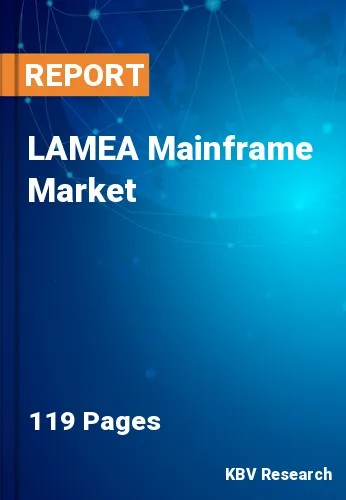Chapter 1. Market Scope & Methodology
1.1 Market Definition
1.2 Objectives
1.3 Market Scope
1.4 Segmentation
1.4.1 LAMEA Mainframe Market, by Type
1.4.2 LAMEA Mainframe Market, by End User
1.4.3 LAMEA Mainframe Market, by Country
1.5 Methodology for the research
Chapter 2. Market at a Glance
2.1 Key Highlights
Chapter 3. Market Overview
3.1 Introduction
3.1.1 Overview
3.1.1.1 Market Composition and Scenario
3.2 Key Factors Impacting the Market
3.2.1 Market Drivers
3.2.2 Market Restraints
3.2.3 Market Opportunities
3.2.4 Market Challenges
Chapter 4. Competition Analysis – Global
4.1 Market Share Analysis, 2023
4.2 Strategies Deployed in Mainframe Market
4.3 Porter Five Forces Analysis
Chapter 5. LAMEA Mainframe Market by Type
5.1 LAMEA Z Systems Market by Country
5.2 LAMEA GS Series Market by Country
5.3 LAMEA Others Market by Country
Chapter 6. LAMEA Mainframe Market by End User
6.1 LAMEA BFSI Market by Country
6.2 LAMEA IT & Telecom Market by Country
6.3 LAMEA Manufacturing Market by Country
6.4 LAMEA Travel & Transportation Market by Country
6.5 LAMEA Retail & E-commerce Market by Country
6.6 LAMEA Government & Public Sector Market by Country
6.7 LAMEA Others Market by Country
Chapter 7. LAMEA Mainframe Market by Country
7.1 Brazil Mainframe Market
7.1.1 Brazil Mainframe Market by Type
7.1.2 Brazil Mainframe Market by End User
7.2 Argentina Mainframe Market
7.2.1 Argentina Mainframe Market by Type
7.2.2 Argentina Mainframe Market by End User
7.3 UAE Mainframe Market
7.3.1 UAE Mainframe Market by Type
7.3.2 UAE Mainframe Market by End User
7.4 Saudi Arabia Mainframe Market
7.4.1 Saudi Arabia Mainframe Market by Type
7.4.2 Saudi Arabia Mainframe Market by End User
7.5 South Africa Mainframe Market
7.5.1 South Africa Mainframe Market by Type
7.5.2 South Africa Mainframe Market by End User
7.6 Nigeria Mainframe Market
7.6.1 Nigeria Mainframe Market by Type
7.6.2 Nigeria Mainframe Market by End User
7.7 Rest of LAMEA Mainframe Market
7.7.1 Rest of LAMEA Mainframe Market by Type
7.7.2 Rest of LAMEA Mainframe Market by End User
Chapter 8. Company Profiles
8.1 Broadcom, Inc.
8.1.1 Company Overview
8.1.2 Financial Analysis
8.1.3 Segmental and Regional Analysis
8.1.4 Research & Development Expense
8.1.5 Recent strategies and developments:
8.1.5.1 Partnerships, Collaborations, and Agreements:
8.1.6 SWOT Analysis
8.2 IBM Corporation
8.2.1 Company Overview
8.2.2 Financial Analysis
8.2.3 Regional & Segmental Analysis
8.2.4 Research & Development Expenses
8.2.5 Recent strategies and developments:
8.2.5.1 Product Launches and Product Expansions:
8.2.5.2 Acquisition and Mergers:
8.2.6 SWOT Analysis
8.3 DXC Technology Company
8.3.1 Company Overview
8.3.2 Financial Analysis
8.3.3 Segmental and Regional Analysis
8.3.4 Recent strategies and developments:
8.3.4.1 Partnerships, Collaborations, and Agreements:
8.3.5 SWOT Analysis
8.4 Hewlett Packard Enterprise Company
8.4.1 Company Overview
8.4.2 Financial Analysis
8.4.3 Segmental and Regional Analysis
8.4.4 Research & Development Expense
8.4.5 SWOT Analysis
8.5 Atos Group
8.5.1 Company Overview
8.5.2 Financial Analysis
8.5.3 Segmental Analysis
8.5.4 SWOT Analysis
8.6 Dell Technologies, Inc.
8.6.1 Company Overview
8.6.2 Financial Analysis
8.6.3 Segmental and Regional Analysis
8.6.4 Research & Development Expense
8.6.5 SWOT Analysis
8.7 HCL Technologies Ltd. (HCL Enterprises)
8.7.1 Company Overview
8.7.2 Financial Analysis
8.7.3 Segmental and Regional Analysis
8.7.4 Research & Development Expenses
8.7.5 SWOT Analysis
8.8 BMC Software, Inc. (KKR & Co., Inc.)
8.8.1 Company Overview
8.8.2 Financial Analysis
8.8.3 Recent strategies and developments:
8.8.3.1 Product Launches and Product Expansions:
8.8.3.2 Acquisition and Mergers:
8.8.4 SWOT Analysis
8.9 Cognizant Technology Solutions Corporation
8.9.1 Company overview
8.9.2 Financial Analysis
8.9.3 Segmental and Regional Analysis
8.9.4 SWOT Analysis
8.10. Fujitsu Limited
8.10.1 Company Overview
8.10.2 Financial Analysis
8.10.3 Segmental and Regional Analysis
8.10.4 Research & Development Expenses
8.10.5 SWOT Analysis

